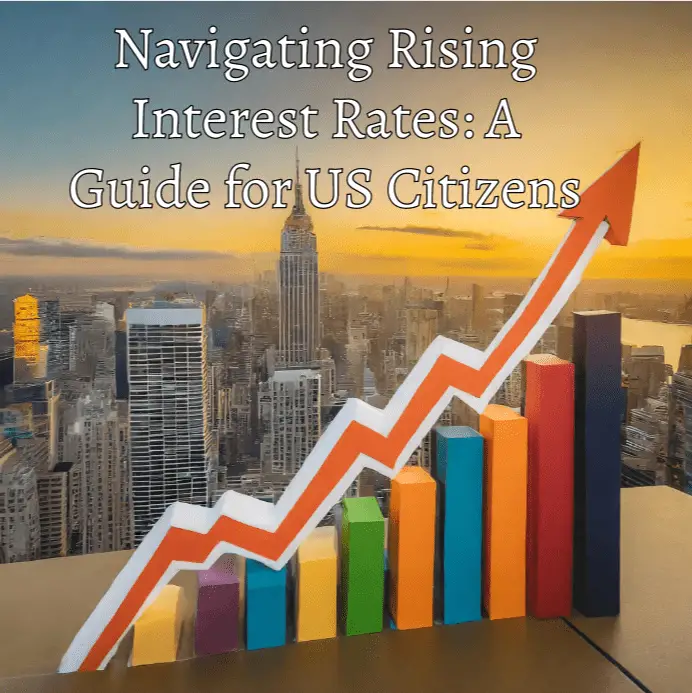Navigating Rising Interest Rates: A Guide for US Citizens ,In a landscape of fluctuating interest rates, staying informed and adapting financial strategies becomes paramount. Recent shifts in interest rates in the United States necessitate a reevaluation of individual financial plans. Navigating through the challenges posed by rising interest rates requires vigilance, strategic planning, and well-informed decision-making. In this blog post, we will delve into what rising interest rates mean for US citizens and provide practical tips to navigate these changes effectively.

Understanding Rising Interest Rates:
Interest rates respond to economic factors like inflation, changes in Federal Reserve policies, and overall economic growth. As interest rates ascend, borrowing becomes costlier, impacting mortgages, credit card debt, and other loans. Moreover, rising interest rates influence savings and investment returns, affecting retirement accounts, savings accounts, and bond yields.
Impact on Borrowing:
For US citizens, escalating interest rates result in higher borrowing costs. Variable-rate loans, such as adjustable-rate mortgages or credit cards with variable APRs, may experience increased monthly payments. To mitigate this impact, consider refinancing fixed-rate loans to secure lower rates before further increases. Additionally, prioritizing the repayment of high-interest debt can alleviate the long-term burden of rising interest rates.
Managing Savings and Investments:
Rising interest rates can impact savings and investment portfolios. While savings account interest rates may see slight increases, they often lag behind rising rates. Exploring alternative options like high-yield savings accounts or certificates of deposit (CDs) can maximize returns. Reviewing your investment strategy to align with your risk tolerance and financial goals in a rising interest rate environment is crucial. Diversifying your investment portfolio with a mix of assets can help mitigate risk and optimize returns over time.
Preparing for Housing Market Changes:
Prospective homebuyers must anticipate the impact of rising interest rates on affordability and purchasing power. Higher mortgage rates lead to increased monthly payments, potentially limiting borrowing capacity or affecting the type of home one can afford. Adjusting budgets and exploring alternative financing options, such as fixed-rate mortgages or adjustable-rate mortgages with rate caps, is advisable. Being prepared to act swiftly in a competitive market is key.
Long-Term Financial Planning:
In the face of rising interest rates, maintaining a long-term perspective in financial planning is crucial. Regularly reviewing budgets to identify areas for expense reduction or fund reallocation is essential. Consulting with a financial advisor to develop a comprehensive plan that considers rising interest rates and aligns with short-term and long-term goals is prudent.
While inflation appears to be cooling down, the Federal Reserve is still raising interest rates to combat it. This can impact your finances in various ways, but there are strategies you can use to make the most of the situation and prepare for the future.
Here are some key tips from financial advisors:
1. Make your cash work for you:
CDs: Consider certificates of deposit (CDs) to lock in higher interest rates before they potentially drop next year as the Fed cuts rates.
CD ladders: Spread your money across CDs with different maturity dates using CD ladders. This allows you to reinvest maturing CDs at potentially higher rates.
Money market funds: These funds invest in short-term debt and may offer higher yields than traditional savings accounts.
2. Invest for the long term:
Equities: As inflation cools and the Fed potentially cuts rates, equities may become a more attractive option. Consider adding a higher percentage of stocks to your portfolio for long-term growth.
Consumer staples and dividend-paying stocks: These can provide consistent returns and help hedge against inflation.
Mutual funds and ETFs: Look for options that reinvest dividends to minimize the impact of market volatility.
Real estate investment funds: These may outperform after the rate hike cycle ends.
3. Maximize your workplace retirement plan:
Contribute enough to your employer-sponsored retirement plan to receive the full employer match. This is essentially “free money” you don’t want to miss out on.
4. Revisit your spending habits and large expenses:
Re-evaluate your budget: Look for areas where you can cut back on spending, especially during times like the holiday season.
Adjust shopping habits: Compare prices and look for deals at different stores.
Consider lifestyle changes: If your budget is truly strained, explore bigger changes like downsizing your home or moving to a more affordable area.
Remember, consulting with a financial advisor can help you develop personalized strategies based on your specific financial situation and goals.
Conclusion:
Rising interest rates pose challenges and opportunities for US citizens in personal finance. Understanding the implications and implementing proactive strategies allows individuals to navigate changes effectively and position themselves for financial success. Whether managing debt, optimizing savings and investments, or planning major purchases like a home, staying informed and adaptable is key to thriving in a changing interest rate environment.
FAQs
Frequently Asked Questions (FAQs)
1. How do rising interest rates impact borrowing?
Rising interest rates lead to higher borrowing costs for US citizens, affecting variable-rate loans like adjustable-rate mortgages or credit cards with variable APRs. Monthly payments may increase, necessitating strategies such as refinancing fixed-rate loans to secure lower rates.
2. How can individuals manage savings and investments amidst rising interest rates?
Exploring alternative options like high-yield savings accounts or certificates of deposit (CDs) can maximize returns. Reviewing investment strategies to align with risk tolerance and financial goals is crucial, with diversification being key to mitigating risk and optimizing returns.
3. What preparations are advisable for prospective homebuyers amid rising interest rates?
Prospective homebuyers must anticipate affordability challenges due to higher mortgage rates. Adjusting budgets and exploring alternative financing options, such as fixed-rate mortgages, is recommended. Being prepared to act swiftly in a competitive market environment is essential.
4. How can individuals engage in long-term financial planning amidst rising interest rates?
Maintaining a long-term perspective is crucial, with regular budget reviews to identify areas for expense reduction or reallocation being essential. Consulting with financial advisors to develop comprehensive plans that consider rising interest rates and align with short-term and long-term goals is prudent.
5. What are some key strategies recommended by financial advisors amidst rising interest rates?
Financial advisors suggest making cash work through certificates of deposit (CDs) or CD ladders, investing for the long term in equities or real estate investment funds, maximizing workplace retirement plans, and revisiting spending habits and large expenses to adapt to changing financial landscapes. Consulting with a financial advisor can provide personalized strategies based on individual financial situations and goals.







Leave a Reply